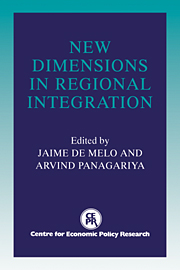Book contents
- Frontmatter
- Contents
- List of figures
- List of tables
- Preface
- Foreword
- Acknowledgements
- List of conference participants
- PART ONE SYSTEMIC ISSUES
- 1 Introduction
- 2 Regionalism and multilateralism: an overview
- Discussion
- 3 Regionalism versus multilateralism: analytical notes
- Discussion
- 4 Multilateral and bilateral trade policies in the world trading system: an historical perspective
- Discussion
- 5 GATT's influence on regional arrangements
- Discussion
- PART TWO COUNTRY ISSUES
- Index
2 - Regionalism and multilateralism: an overview
Published online by Cambridge University Press: 04 May 2010
- Frontmatter
- Contents
- List of figures
- List of tables
- Preface
- Foreword
- Acknowledgements
- List of conference participants
- PART ONE SYSTEMIC ISSUES
- 1 Introduction
- 2 Regionalism and multilateralism: an overview
- Discussion
- 3 Regionalism versus multilateralism: analytical notes
- Discussion
- 4 Multilateral and bilateral trade policies in the world trading system: an historical perspective
- Discussion
- 5 GATT's influence on regional arrangements
- Discussion
- PART TWO COUNTRY ISSUES
- Index
Summary
The question of ‘regionalism’, defined broadly as preferential trade agreements among a subset of nations, is a longstanding one. As with all great issues, economists have long been divided on the wisdom of such arrangements. So have policymakers.
While this may not be evident to the many economists who are not inhibited by lack of comparative advantage from pronouncing on these matters, and whose pronouncements are a testimony to the enduring value of the theory of comparative advantage, preferential trade arrangements were debated by economists, as such, during the very formation of the General Agreement on Tariffs and Trade (GATT). The context, of course, was the difference between the British, led by Keynes, who were devoted to the continuation of the discrimination in Britain's favour through Imperial Preference, and the Americans, with Cordell Hull to the fore, who were strongly opposed, and embraced multilateralism and most favoured nation status (MFN) instead. Keynes, quite characteristically, at first denounced the American attachment to non-discrimination in trade and then later, when the British had virtually capitulated, celebrated its virtues with equal passion. I will juxtapose the two positions in Keynes’ inimitable words, quoted in Bhagwati (1991a):
My strong reaction against the word ‘discrimination’ is the result of feeling so passionately that our hands must be free … [T]he word calls up and must call up … all the old lumber, most-favored-nation clause and all the rest which was a notorious failure and made such a hash of the old world. We know also that it won't work. It is the clutch of the dead, or at least the moribund, hand.
- Type
- Chapter
- Information
- New Dimensions in Regional Integration , pp. 22 - 51Publisher: Cambridge University PressPrint publication year: 1993
- 213
- Cited by

